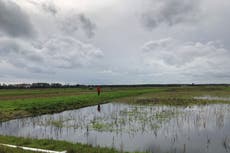Fines for polluting water companies to rise 1,000-fold under plans to clean up rivers and seas
Fines for polluting water companies to rise 1,000-fold to £250m under plans to clean up rivers and seas, government says

The new environment secretary, Ranil Jayawardena, has said the government will act to clean up the UK’s rivers and seas with considerable rises to maximum fines for polluting water companies.
Speaking at the Conservative Party conference, Mr Jayawardena announced plans for up to a 1,000-fold increase in civil fines for water companies which illegally breach permit conditions.
This means that maximum fines for each individual breach of the rules will go up from £250,000 to £250m.
To date, the largest fine ever handed to a water company by the Environment Agency was to Southern Water in 2021 which was ordered to pay a record £90m for widespread pollution after pleading guilty to 6,971 unpermitted sewage discharges between 2010 and 2015.
At the time, the judge said the company had shown “a shocking and wholesale disregard for the environment”.
But since then, anger at the level of sewage routinely entering British rivers, lakes and seas has grown, with England’s watercourses now the most polluted in Europe.
Plans announced by the government earlier this year – then under Boris Johnson’s administration – require water companies to invest £56bn in capital investment over the next 25 years in infrastructure and improvements to reduce pollution.
But after Conservative MPs voted against measures to make sewage dumping illegal, opposition parties ridiculed the 25-year investment legislation, saying it was nothing more than a “cruel joke” and a “licence to pollute”.
In a statement on Monday, the government defended the legislation as “the most significant investment and delivery programme ever undertaken by water companies to protect people and the environment”.
Mr Jayawardena said: “On my first day in office, I met water company bosses to give them their report card. I’ll be polite: could do better.
“I asked them to write to me with their plans to accelerate investment in infrastructure. They did and now they must deliver. Privatisation has put in £170bn of investment into our water infrastructure already, and the private sector will now put in another £56bn more.
“And, if they don’t deliver, I can confirm to you today that we will take forward plans to lift the Environment Agency’s maximum civil fine for each individual breach of the rules from up to just £250,000, to up to £250m.”
In a statement ahead of Mr Jayawardena’s announcement at the Conservative Party conference, the government said: “The environment secretary also made clear that the environment, food production and economic growth go hand in hand.”
It is not clear what this statement means as the connections between the economy, the food system and the environment are long established.
However, Liz Truss’s preferred means of boosting economic growth is causing growing alarm among environmentalists, scientists, farmers and campaigners, particularly over plans to drop post-Brexit land subsidy schemes designed to promote biodiversity and tackle the climate crisis.
Furthermore, chancellor Kwasi Kwarteng’s mini-Budget also announced the creation of large “investment zones” across swathes of the English countryside where planning rules would be “liberalised” and “streamlined” – something that charities including the RSPB, the National Trust and the WWF have described as amounting to an “attack on nature”.
Join our commenting forum
Join thought-provoking conversations, follow other Independent readers and see their replies
Comments



Bookmark popover
Removed from bookmarks